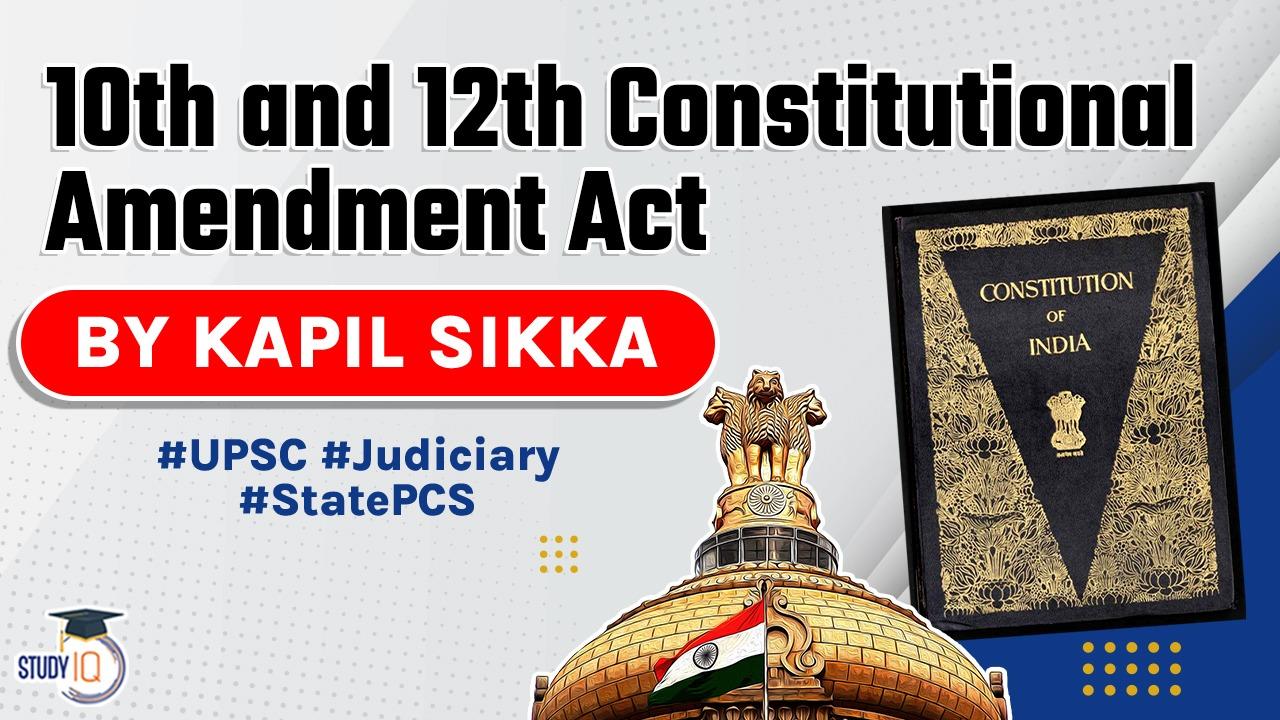Table of Contents

10th And 12th amendment 1961


- The integration of Dadra and Nagar Haveli into India was not recognized by any other countries before 1974.
- In the decision of 12 April 1960 in the “Case Concerning Right of Passage Over Indian Territory”, the International Court of Justice clearly stated that Portugal had sovereign rights over the territories of Dadra and Nagar Haveli but India had the right to deny passage to armed personnel of Portugal over Indian territories.
STATEMENT OF OBJECTS AND REASONS
- The people and the Varishta Panchayat of Free Dadra and Nagar Haveli have repeatedly affirmed their request to the Government of India for integration of their territories with the Union of India to which they rightly belong.

- Their request was recently embodied in a formal Resolution adopted by the Varishta Panchayat on the 12th June, 1961.
Tenth Amendment Act, 1961
-
- the Government of India decided that these territories
should form part of the Union of India. - Dadra and Nagar Haveli by amending the First Schedule to the Constitution. It is further proposed to amend clause (1) of article 240 of the Constitution to include therein the Union territory of Dadra and Nagar Haveli in order to enable the President to make regulations for the peace, progress and good government of the territory.
- the Government of India decided that these territories

STATEMENT OF OBJECTS AND REASONS
- On the acquisition of the territories of Goa, Daman and Diu with effect from the 20th December, 1961, these territories have, by virtue of sub-clause (c) of clause (3) of article 1 of the Constitution, been comprised within the territory of India from that date and they are being administered as a Union territory by the President through an Administrator in accordance with article 239 of the Constitution.
- It is, however, considered desirable that Goa, Daman and Diu should be specifically included as a Union territory in the First Schedule to the Constitution. It is also considered that clause (1) of article 240 should be suitably amended to confer power on the President to make regulations for the peace, progress and good government of Goa, Daman and Diu, as has been done in the case of Dadra and Nagar Haveli.

- Before the arrival of the Portuguese, both Daman and Diu (which are separated by the Gulf of Khambhat) were part of the Sultanate of Gujarat —
- an independent kingdom comprising present-day Gujarat and neighbouring areas during the 15th and 16th centuries.
- Early in the 16th century, the Sultan of Gujarat, Bahadur Shah, came under immense pressure when his kingdom was invaded by the second Mughal Emperor Humayun.
- At that juncture, he decided to remain on conciliatory terms with the Portuguese, who had arrived in India at the end of the 15th century, and were at the time an energetic and ambitious maritime power.
- In 1534, the Shah signed the Treaty of Bassein with the Portuguese, ceding Diu to the latter, as well as other territories of his empire such as Vasai and the islands that today form Mumbai. The Portuguese obtained Daman from the Shah in 1559.
- For over four centuries, both Daman and Diu remained part of the Portuguese dominions in India, and were ruled from Goa.
- Immediately in December 1961, Goa, Daman and Diu were constituted into the Union Territory of Goa, Daman and Diu.

Constitutional Amendment Series Download Free PDF





















 WhatsApp
WhatsApp